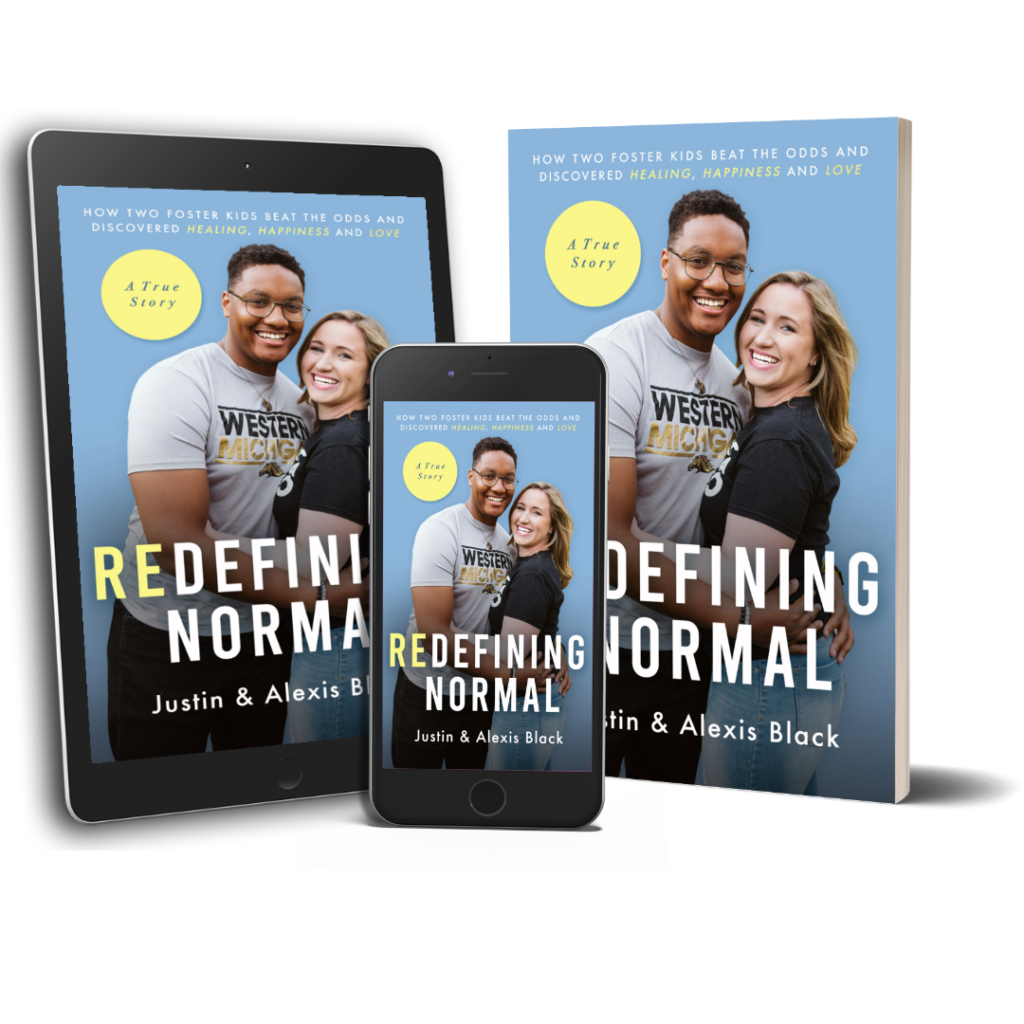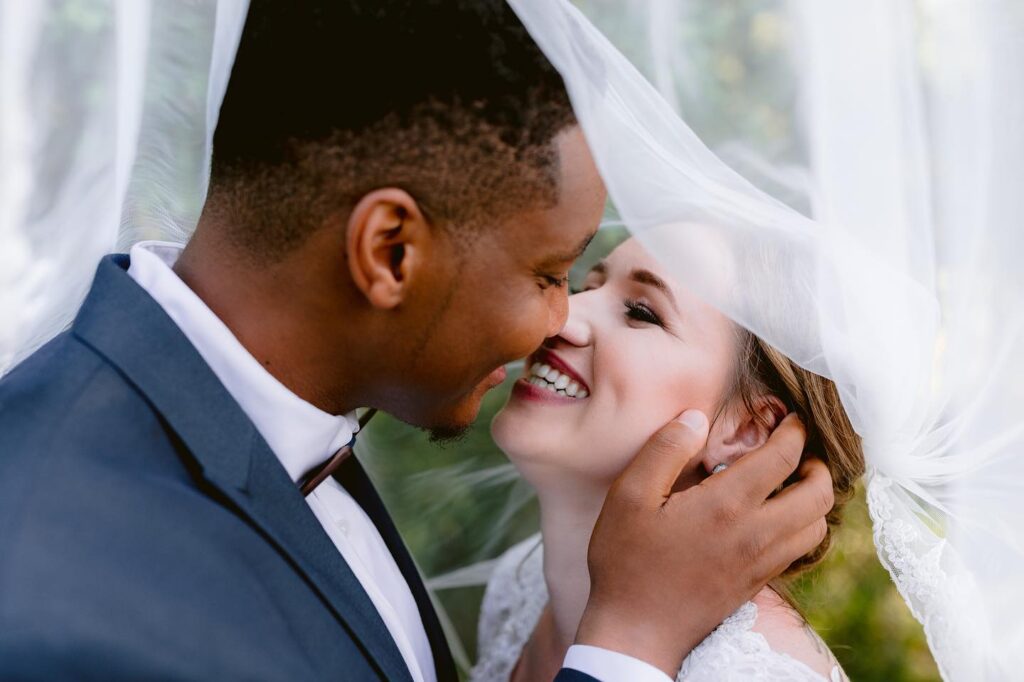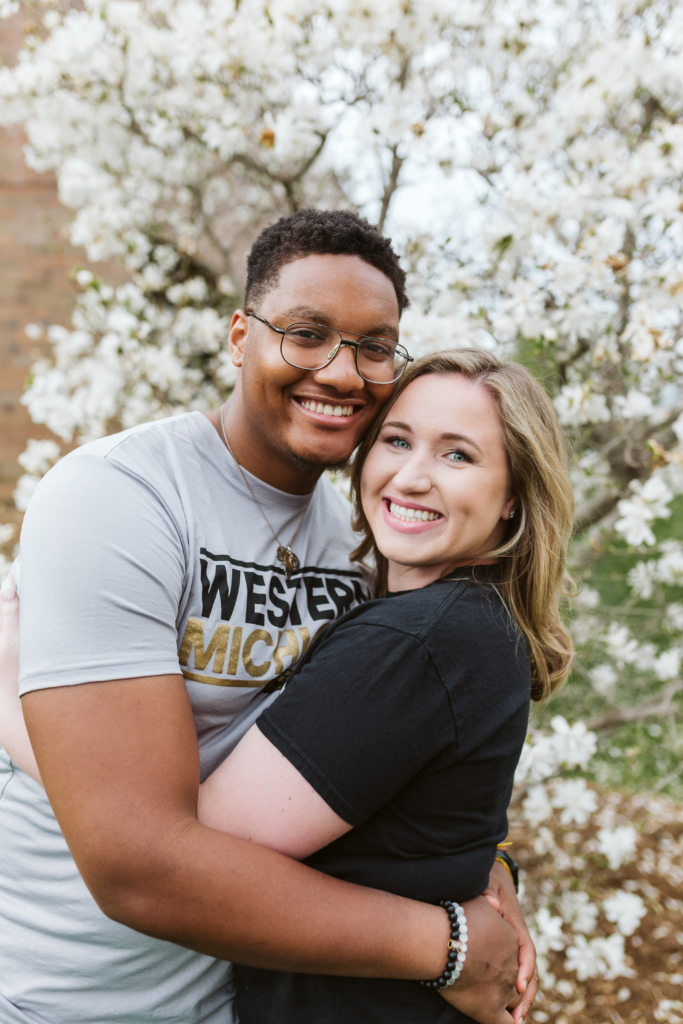Justin: My name is Justin Black and I am from Detroit, Michigan. I went to Western Michigan University and just graduated with a degree in Public Relations and African Studies.
Part of the reason why we wrote this book was to talk about our life experiences as it relates to different subject matters regarding redefining our mindsets, redefining mental health, and redefining what it means to be a family and to love. I’ve been in the foster care system since the age of 9 because my family dealt with drug addiction, domestic abuse, and poverty.
When digging into my family’s history and growing up, I realized as a teenager that drug abuse has been in my family for almost two generations, and domestic violence has been in my family for almost three generations. Now, in my life, I had to make these decisions and redefine what it means to live a healthy life and love those around me, as well as redefine what family and love means. I really had to think about what it means to really love somebody, and what are the characteristics of that?
Alexis: I’m Alexis Black. I also grew up in foster care and I entered foster care at 13 because my dad was incredibly abusive to me. It was physical, emotional, sexual abuse for over 8 years. After he went to prison, I had to testify against him, and then I went and lived with family members who were emotionally and mentally abusive as well. I didn’t really get to heal from that past trauma. To add, I was in an eight-year abusive relationship, so everything really just compounded on each other. When Justin and I got together, we were really intentional about how we can make sure that we’re not going to end up like most other relationships that we’ve seen or pretty much every relationship that we’ve seen: incredibly toxic and unhealthy.
It wasn’t until I met my foster and now adoptive parents that I learned what a healthy relationship is and what it looks like. They modeled how you communicate, how you handle conflict, healthy parenting styles, and all these different things that completely changed the dynamic of how I thought and approached life and relationships. I have this saying: what would Kim do? Kim is my mom now. I really look up to her, and she’s my role model in so many ways. Meeting them and learning from them has really changed my dynamic.

The book originally started as something I was going to write by myself. Last year, people kept planting seeds and saying you need to write a book. I would say maybe one day, but then it just was really on my heart. Later while I was in D.C., I thought maybe I should do it. I just finished an internship and I have some free time right now, so what should I do? Justin was like, maybe you should start with a topic that you talk about all the time. Instantly, I thought, healthy relationships. That to me was just blatantly clear that that’s what it needs to be on, because that’s what I talk about pretty much every day. Then it got overwhelming. I had this huge topic and I’m thinking, how do I tackle this and what kind of avenue or route do I take? I was really lost on that.
My pastor and my friend referred this book to me called Published by Chandler Bolt. That book really gave us the blueprint of how to lay out a book. It guided us on how to figure out chapters, how to take large ideas and break it down into smaller segments, and how to really hone in on stories and situations. It was when Justin and I were in Luxor, Egypt, that we decided that we were going to write it together. We were on our way to South Africa and doing this huge mind map. We began coming up with our topics like mental health, boundaries, toxic relationships, and domestic violence.
Justin: Other topics are, just going off the chapter titles, the definition of love, how individuals develop their identity, and mental health. Also, communication and thinking about the way people communicate with their family, how to effectively communicate, assessing where you learned your communication style, and how you learned to communicate with other people. We dug deep into those ideas. Even though it’s a book, it’s also a memoir about our lives. It’s like a back and forth account of our perspectives.
We chose the name Redefining Normal because that’s kind of been on my heart for the last year. I’ve been just saying things like how is normal defined around us? How is it defined as a white female, as a black male, and as a foster youth? We’re taking into account all these different identities that we have and thinking about what is the “normal” around that? We actually had somebody say we shouldn’t name the book that because normal is kind of played out. I didn’t agree because this is the foundation of everything in the book. It is about how society told us what normal was and how we had to break out of that to be us.

Then we chose the subtitle, how to foster you, beat the odds and discover healing, happiness and love. I want people to understand that this isn’t just a memoir. It’s also a book about how we accomplished these things and how it is possible for other people. I wanted to make sure that people had solid takeaways that they could use. People can pick and choose what relates to them and what they can use. This is just a blueprint to get you thinking and analyzing your relationship, whether it’s intimate, familial, or professional.
Justin: I feel like this would be a good foundation to hang our hat on. I think this process has taught me so much about writing and writing a book. I think it’s so much to learn from our lives. Our mentors and other people who’ve written books have always told us to write about something that will come easy to you and something that you talk about all the time. We see a lot of our friends that may have gone through certain situations, circumstances, and unhealthy relationships. As someone who has been through the foster care system, you interact with a lot of people who’ve experienced a lot of bad family relationships. We see people internalize things and express their trauma in a certain way. We felt like it was just such a big need at this time for a lot of people.
We know a lot of young people who are looking for another person to depend on, but should be focusing on finding themselves. I really wanted to write a book about self-discovery before jumping into a relationship because so many people’s identities have been tied to a relationship. Even though this is our first book, it is a good foundational book that so many other books can come out of it. There are so many subjects within this book that can be isolated and made into its own book, such as mental health or black mental health. It’s just the perfect foundation, and that is why I felt it was important for this to be our first book.
Another reason why we did alternating narratives throughout the book is because we wanted to show people that we had to go through journeys of self-discovery and healing individually before we could come together. People have a tendency to look to others to fill your voids and to heal, but only you can heal you. That’s between yourself and God or whatever you believe in. It was important for us that we went through that individual journey before coming together because we can’t solve each other’s stuff. One conversation that we had before Justin started going to counseling was he said, “I don’t need to go to a counselor. I have you.” And I was like, pause, I’m not trained or certified to help you in this way. I’m your partner and I love you, but I’m not equipped to help you in the way that you need to be helped. It’s not fair for you to put that on me or for me to put my stuff on you.
The biggest thing for us in the year that we were getting married is how to talk about everything, meaning every fear, vulnerability, and trauma. There was nothing we left off the table, and we are really publishing our diary right now. Most people would probably think that is terrifying because you are sharing all your baggage with the world, but not to us. This is the real us and what we went through, and I’m good with sharing that because I feel it is going to help other people. I’m a firm believer in when you share your story, it helps other people share theirs and heal from theirs.

Justin: Our main audience is young people who are both single and in relationships. It doesn’t matter if they are early on in the relationship or further along in it. We are really just trying to spread a message of self discovery and finding yourself. Of course, a lot of people in the foster care world will be attracted to our book because that has been a large part of our experiences. Who we are and how we identify has all been shaped in some way by foster care and it is also in the subtitle. But even if you never experienced foster care, you can still relate to this book. There are a lot of people out there who could have identical experiences than us, but just were never placed in the system. There are people out there who grew up in an environment where there was drug addiction and domestic abuse, but because they were never in the system, they just had to grow up in it and deal with it.
With that, I would say our audience is young people who are trying to identify themselves in a certain way and challenge what they thought to be normal. Someone who is asking themselves what are my habits or what are those things that come natural to me, but aren’t good for me. Is this something that I chose or is this something that has been passed down to me from previous generations. There are so many things that have been normalized in culture or in certain communities and neighborhoods. It can be really challenging to break those generational cycles that are destroying you and negatively impacting the people around you. So if you are in a relationship with someone, getting to understand what it means to come together and not putting trauma or toxicity on one another. Learning what it means to embrace, empower, and understand one another. Also, understanding that you are a whole person and not looking for another person to make you whole. Yeah you can go to your partner for help with certain things, but ultimately your help comes from God or whatever that higher power is for you.
Alexis: Yes, this book could apply to everybody depending on how you read it. We were purposeful in choosing a mix of different people to proofread the book. Most were not in foster care. We have 2 foster care people, but we also have some mothers, some dads, college students, and people from all over the spectrum proofread the book. We wanted to get their perspective and to see if they would find it relatable. Every single person said that they learned something from it or gained some insight from it. We are hoping that we speak life into others through this book. Whether it is a relationship, business, or idea, people can see where we started and how we didn’t let our circumstances limit us. We also wanted this to be a gateway for other conversations or a way to deepen conversations.
Justin: I just want to reiterate that this book is not just for people in or interested in relationships. This is really a book about discovering your identity. For me, I am very particular about men reading this book. Because of the alternating pattern in the book, I think it can be easy for guys wanting to skip past Alexis’s part, but I would encourage them to read her part, too. I’ve had a lot of conversations with friends and family about how people think that women who continue to find themselves in abusive relationships, that it is their choice or that’s what she wants. I think it is really important to read her part and follow her trauma to get a better understanding of what she really went through. I think when men meet a woman who has been through a lot of trauma, and she has internalized that trauma, they assume that they chose that lifestyle, but that is not the case. It’s like that person’s backstory and what they’ve been through is not taken into consideration. I think men reading this book will get a better understanding of the trauma some women go through whether it’s emotional, mental, physical, or sexual. So, if you meet someone who is internalizing their trauma, you will be less judgemental and more willing to dig a little deeper to get a better understanding of why they may do things a certain way or behave a certain way.
Alexis: We want this book to be for everybody, not necessarily just Christians or foster youth. This book is for anybody who struggles with healthy relationships, family, or any of these topics that we talk about. This book is for you!

Editor’s Note: This blog is fully in the authors’ words.
Learn more about Justin and Alexis, and how to order their book on their website.
For general questions or inquiries, please contact:
Tel: 248-289-0844 | info@re-definingnormal.com
For any media inquiries, please contact:
Tel: 248-289-0844 | press@re-definingnormal.com
Facebook: @redefiningnormalmemoir
Instagram: @re.definingnormal